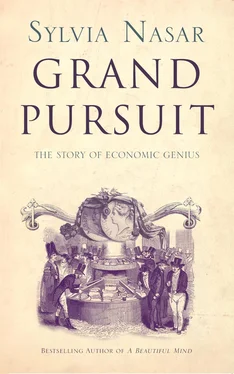Mark Blaug, a historian of economic thought, points out that if only labor hours create value, then installing more efficient machinery, reorganizing the sales force, hiring a more effective CEO, or adopting a better marketing strategy—rather than hiring more production workers—necessarily causes profits to fall. In Marx’s scheme, therefore, the only way to keep profits from shrinking is to exploit labor by forcing workers to work more hours without compensating them. As Henry Mayhew detailed in his Morning Chronicle series, there are many ways of cutting the real wage. It is crucial for Marx’s argument, writes Blaug, that trade unions and governments—“organizations of the exploiting class”—can’t reverse the process. 104
A surprising number of scholars deny that Marx ever claimed that wages would decline over time or that they were tethered to some biological minimum. But they are overlooking what Marx said in so many words on numerous occasions. The inability of workers to earn more when they produce more—or more-valuable products—is precisely what made capitalism unfit to survive.
By asserting that labor was the source of all value, Marx claimed that the owner’s income—profit, interest, or managerial salary—was unearned. He did not argue that workers did not need capital—factories, machines, tools, proprietary technology, and the like—to produce the product. Rather he argued that the capital the owner made available was nothing more than the product of past labor. But the owner of any resource—whether a horse, a house, or cash—could use it herself. Arguing, as Marx does, that waiting until tomorrow to consume what could be consumed today, risking one’s resources, or managing and organizing a business have no value and therefore deserve no compensation is the same as saying that output can be produced without saving, waiting, or taking risks. This is a secular version of the old Christian argument against interest.
The trouble is, as Blaug points out, that this is just another way of saying that only labor adds value to output—the very statement that Marx set out to prove in the first place—and not an independent proof.
Marx compiled an impressive array of evidence, from Blue Books, newspapers, the Economist, and elsewhere, to show that the living standards of workers were wretched and working conditions horrendous during the second half of the eighteenth and first half of the nineteenth centuries. But he did not succeed in showing either that average wages or living standards were declining in the 1850s and 1860s, when he was writing Das Kapital, or, more to the point, that there was some reason for thinking that they would necessarily decline.
Had Marx stepped outside and taken a good look around like Henry Mayhew, or engaged brilliant contemporaries such as John Stuart Mill who were grappling with the same questions, he might have seen that the world wasn’t working the way he and Engels had predicted. The middle class was growing, not disappearing. Financial panics and industrial slumps weren’t getting worse.
When the Great Exhibition of 1862 closed, the “great festival” refused to disband. A businessman bought the Crystal Palace, had it disassembled and carted to Sydenham in South London, and rebuilt it on an even more monstrous scale. Much to Marx’s disgust, the new Crystal Palace opened as a kind of Victorian Disney World. Worse, the economy boomed. As Marx had to admit, “It is as if this period had found Fortunatas’ purse.” There had been a “titanic advance of production” even faster in the second ten years than in the first:
No period of modern society is so favorable for the study of capitalist accumulation as the period of the last 20 years . . . But of all countries England again furnishes the classical example, because it holds the foremost place in the world-market, because capitalist production is here alone completely developed, and lastly, because the introduction of the Free-trade millennium since 1846 has cut off the last retreat of vulgar economy. 105
More fatal to Marx’s theory, real wages weren’t falling as capital accumulated in the form of factories, buildings, railroads, and bridges. In contrast to the decades before the 1840s, when increases in real wages were largely limited to skilled workers, and the effect on living standards was offset by more unemployment, longer hours, and bigger families, the gains in the 1850s and 1860s were dramatic, unambiguous, and widely discussed at the time. The Victorian statistician Robert Giffen referred to the “undoubted” nature of the “increase of material prosperity” from the mid-1840s through the mid-1870s. 106Robert Dudley Baxter, a solicitor and statistician, depicted the distribution of income in 1867 with an extinct volcano that rose twelve thousand feet above sea level, “with its long low base of laboring population, with its uplands of the middle classes, and with the towering peaks and summits of those with princely incomes.” 107The Peak of Tenerife struck Baxter as a perfect metaphor for describing who got what. Still, his data show that by 1867, labor’s share of national income was rising.
Scholars have since corroborated these contemporary observations. As early as 1963, Eric Hobsbawm, the Marxist economic historian, admitted that “the debate is entirely about what happened in the period which ended by common consent sometime between 1842 and 1845.” 108More recently, Charles Feinstein, an economic historian on the “pessimist” side of a long-running debate on the effects of the industrial revolution, concluded that real wages “at last started an ascent to a new height” in the 1840s. 109
Marx never did step outside. He never bothered to learn English well. 110His world was restricted to a small circle of like-minded émigrés. His contacts with English working-class leaders were superficial. He never exposed his ideas to people who could challenge him on equal terms. His interaction with economists—“commercial travelers for the great firm of Free-trade” 111as he called them—whose ideas he wished to demolish, was nonexistent. He never met or conducted a scientific correspondence with the geniuses—John Stuart Mill, the philosopher; Charles Darwin, the biologist; Herbert Spencer, the sociologist; George Eliot, the writer; among them—who lived (and debated) a mile or two from him. Astonishingly for the best friend of a factory owner and the author of some of the most impassioned descriptions of mechanization’s horrors, Marx never visited a single English factory—or any factory at all until he went on a guided tour of a porcelain manufactory near Carlsbad, where he took the waters toward the end of his life. 112
At Engels’s insistence, in 1859 Marx reluctantly published a preview of his unfinished magnum opus. The thin volume, called A Contribution to the Critique of Political Economy, was greeted with surprise, embarrassment, and virtually no reviews except ones that Engels wrote anonymously at Marx’s behest. 113
Marx had frequently justified his decision to remain in England—and even to seek British citizenship—by pointing to the advantages of London, capital of the modern world, for studying the evolution of society and glimpsing its future. But Isaiah Berlin, himself an émigré, wrote that “he might just as well have spent his exile in Madagascar, provided that a regular supply of books, journals and government reports could have been secured.” By 1851, when he started to work seriously on the critique that he boasted would demolish English economics, Marx’s ideas and attitudes were “set and hardly changed at all” over the next fifteen or more years. 114
When Marx took up the idea of “providing a complete account and explanation of the rise and imminent fall of the capitalist system,” 115his eyesight was so bad that he was forced to hold books and newspapers a few inches from his face. One wonders what effect his myopia had on his ideas. Democritus, the subject of his doctoral dissertation, was said to have blinded himself deliberately. In some versions of his legend, the Greek philosopher is motivated by a desire to avoid being tempted by beautiful women. In others, he wants to shut out the messy, confusing, shifting world of facts so that he can contemplate the images and ideas in his own head without these bothersome distractions.
Читать дальше












